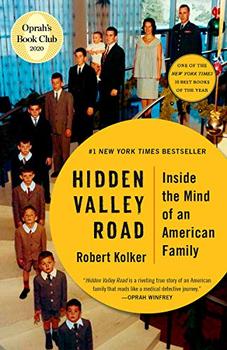Summary | Excerpt | Reading Guide | Reviews | Beyond the Book | Readalikes | Genres & Themes | Author Bio

Inside the Mind of an American Family
by Robert Kolker
The most dreadful thing, perhaps, about schizophrenia—and what most sets it apart from other brain conditions like autism or Alzheimer's, which tend to dilute and dissipate a person's most identifiable personality traits—is how baldly emotional it can be. The symptoms muffle nothing and amplify everything. They're deafening, overpowering for the subject and frightening for those who love them—impossible for anyone close to them to process intellectually. For a family, schizophrenia is, primarily, a felt experience, as if the foundation of the family is permanently tilted in the direction of the sick family member. Even if just one child has schizophrenia, everything about the internal logic of that family changes.
But the Galvins never were an ordinary family. In the years when Donald was the first, most conspicuous case, five other Galvin brothers were quietly breaking down.
There was Peter, the youngest boy and the family rebel, who was manic and violent, and who for years refused all help.
And Matthew, a talented ceramic artist, who, when he wasn't convinced that he was Paul McCartney, believed that his moods controlled the weather.
And Joseph, the most mild-mannered and poignantly self-aware of the sick boys, who heard voices, as real to him as life itself, from a different time and place.
And Jim, the maverick second son, who feuded viciously with Donald and went on to victimize the most defenseless members of his family—most notably the girls, Mary and Margaret.
And, finally, Brian, perfect Brian, the family's rock star, who kept his deepest fears a secret from them all—and who, in one inscrutable flourish of violence, would change all of their lives forever.
*
The dozen children in the Galvin family perfectly spanned the baby boom. Donald was born in 1945, Mary in 1965. Their century was the American century. Their parents, Mimi and Don, were born just after the Great War, met during the Great Depression, married during World War II, and raised their children during the Cold War. In the best of times, Mimi and Don seemed to embody everything that was great and good about their generation: a sense of adventure, industriousness, responsibility, and optimism (anyone who has twelve children, the last several against the advice of doctors, is nothing if not an optimist). As their family grew, they witnessed entire cultural movements come and go. And then all the Galvins made their own contribution to the culture, as a monumental case study in humanity's most perplexing disease.
Six of the Galvin boys took ill at a time when so little was understood about schizophrenia—and so many different theories were colliding with one another—that the search for an explanation overshadowed everything about their lives. They lived through the eras of institutionalization and shock therapy, the debates between psychotherapy versus medication, the needle-in-a-haystack search for genetic markers for the disease, and the profound disagreements about the cause and origin of the illness itself. There was nothing generic about how they each experienced the illness: Donald, Jim, Brian, Joseph, Matthew, and Peter each suffered differently, requiring differing treatments and a panoply of shifting diagnoses, and prompting conflicting theories about the nature of schizophrenia. Some of those theories could be especially cruel to the parents, who often took the blame, as if they'd caused the disease by something they did or did not do. The entire family's struggle doubles as a thinly veiled history of the science of schizophrenia—a history that for decades took the form of a long argument over not just what caused the illness, but what it actually is.
The children who did not become mentally ill were, in many respects, as affected as their brothers. It is hard enough to individuate oneself in any family with twelve children; here was a family that was defined by dynamics like no other, where the state of being mentally ill became the norm of the household, the position from which everything else had to start. For Lindsay, her sister, Margaret, and their brothers John, Richard, Michael, and Mark, being a member of the Galvin family was about either going insane yourself or watching your family go insane—growing up in a climate of perpetual mental illness. Even if they happened not to descend into delusions or hallucinations or paranoia—if they didn't come to believe that the house was under attack, or that the CIA was searching for them, or that the devil was under their bed—they felt as if they were carrying an unstable element inside themselves. How much longer, they wondered, before it would overtake them, too?
Excerpted from Hidden Valley Road by Robert Kolker. Copyright © 2020 by Robert Kolker. All rights reserved. No part of this excerpt may be reproduced or reprinted without permission in writing from the publisher.
We must believe in luck. For how else can we explain the success of those we don't like?
Click Here to find out who said this, as well as discovering other famous literary quotes!
Your guide toexceptional books
BookBrowse seeks out and recommends the best in contemporary fiction and nonfiction—books that not only engage and entertain but also deepen our understanding of ourselves and the world around us.